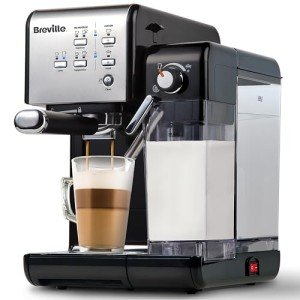The Largest Issue That Comes With High-Quality Espresso Machines, And How You Can Fix It
The World of High-Quality Espresso Machines: A Comprehensive Guide
Espresso has actually become a cherished beverage amongst coffee enthusiasts worldwide, understood for its abundant taste, intense fragrance, and versatility. The heart of a terrific espresso depends on the machine used to brew it. High-quality espresso machines are designed to provide the ideal shot, making them a necessary financial investment for coffee enthusiasts. This short article checks out numerous types of high-quality espresso machines, their functions, maintenance ideas, and responses to often asked concerns.
Kinds Of High-Quality Espresso Machines
High-quality espresso machines fall into numerous classifications, accommodating various choices, skill levels, and spending plans. The main types consist of:
Type of Machine
Description
Ideal User
Requires user ability to manage extraction and pressure. Provides Bean To Cup Espresso Machines over the brewing process.
Experienced baristas and lovers
Semi-Automatic Machines
Integrates manual operation with automation. Users manage the grind and tamping, while the machine manages water dispersion.
Intermediate users
Automatic Espresso Machines
Automate the brewing procedure, enabling programmable developing times and temperatures.
Casual coffee drinkers
Super-Automatic Machines
Have built-in grinders and are fully automated, handling everything from grinding to brewing and steaming.
Users looking for benefit
Commercial Espresso Machines
Designed for high volume use in cafes and restaurants, offering sturdiness and speed.
Company owner
Comprehensive Overview of Each Type
Manual Espresso Machines
- Pros: Complete control over the brewing procedure; can produce remarkable quality espresso.
- Cons: Requires significant ability; time-consuming.
Semi-Automatic Machines
- Pros: Balanced control, mixing manual and automatic processes; remarkable quality espresso is still achievable.
- Cons: Requires some understanding and experience to master.
Automatic Espresso Machines
- Pros: User-friendly; decreases the discovering curve while still producing high-quality espresso.
- Cons: Still requires some understanding of coffee-making basics.
Super-Automatic Machines
- Pros: Maximal convenience; little skill required; suitable for individuals or families who desire coffee without fuss.
- Cons: Higher price point; might do not have the fine-tuning capabilities of manual machines.
Commercial Espresso Machines
- Pros: Built for durability and performance; typically consists of functions for high-volume turns.
- Cons: Expensive; might be overkill for home use.
Secret Features to Consider
When searching for a high-quality espresso machine, a number of crucial functions ought to be taken into consideration:
- Pressure and Pump Type: Look for machines with at least 9 bars of pressure, which is necessary for drawing out the very best taste from coffee beans.
- Boiler Type: Single, double, and heat exchanger boilers each impact how the machine performs and the speed of brewing.
- Construct Quality: High-quality materials such as stainless-steel are preferable for toughness and aesthetics.
- Relieve of Use and Cleaning: Some machines require extensive cleaning, while others are designed for easy maintenance.
- Temperature level Control: Consistent temperature level is crucial; think about machines with PID controllers for precise control.
Advantages of High-Quality Espresso Machines
Investing in a high-quality espresso machine offers a plethora of advantages:
- Superior Quality: High-end machines permit higher control, resulting in more delicious espresso.
- Toughness: Built to last, quality machines require less repairs and replacements.
- Personalization: Users can take pleasure in a tailored experience by adjusting grind size, shot timing, and other settings.
- Increased Convenience: Automatic and super-automatic alternatives allow fanatics to delight in espresso with very little effort.
Maintenance and Care for High-Quality Espresso Machines
To keep an espresso machine working optimally, routine upkeep is vital. Here are tips for maintaining a high-quality espresso machine:
Descale Regularly:
- Use a descaling service every few months to prevent accumulation of minerals from water, which can affect taste and performance.
Tidy the Brew Group:
- For machines with a removable brew group, clean it regularly to make sure a tidy extraction.
Change Water Filters:
- Use a water filter and alter it as needed to lessen impurities in your developing water.
Daily Cleanings:
- Rinse the portafilter and group head after each use to prevent oil buildup.
Watch on the Parts:
- Monitor seals, gaskets, and other parts for wear and tear and replace them as needed.
Often Asked Questions (FAQs)
1. What is the very best espresso machine for beginners?
For novices, a semi-automatic machine often offers a good balance of usability and control, enabling users to learn the skills required for making terrific espresso.
2. Are super-automatic machines worth the investment?
Yes, for those who prioritize convenience and ease over control, super-automatic machines can be a worthwhile financial investment, especially for households or busy specialists.
3. How much should I expect to spend on a high-quality espresso machine?
High-quality espresso machines range significantly in price, with manual machines beginning at a couple of hundred dollars, while super-automatic or commercial machines can surpass a number of thousand.
4. Can I make other coffee beverages with an espresso machine?
Yes, lots of espresso machines have steam wands or accessories that enable users to develop lattes, cappuccinos, and more.
5. For how long do espresso machines normally last?
With proper upkeep, high-quality espresso machines can last over a decade, making them a long-term investment in your coffee pleasure.
High-quality espresso machines yield a transformative coffee experience, whether delighted in in the house or in a commercial setting. By understanding the types offered, their features, and the maintenance required to keep them running effectively, consumers can make educated decisions that raise their coffee-drinking experience.
